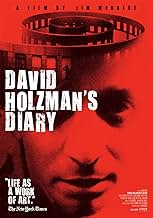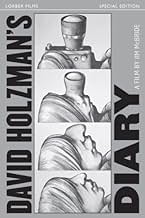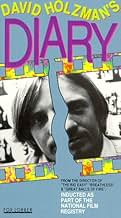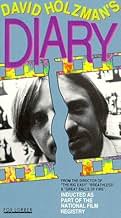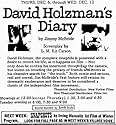IMDb रेटिंग
6.5/10
2 हज़ार
आपकी रेटिंग
अपनी भाषा में प्लॉट जोड़ेंA young filmmaker decides to make a movie of his life.A young filmmaker decides to make a movie of his life.A young filmmaker decides to make a movie of his life.
- पुरस्कार
- कुल 2 जीत
Eileen Dietz
- Penny Wohl
- (as Penny Wohl)
Mike Levine
- Sandra's Boy Friend
- (as Michel Lévine)
Robert Lesser
- Max, Penny's agent
- (as Bob Lesser)
फ़ीचर्ड समीक्षाएं
If you liked the Blair Witch Project, this is where they probably got the idea. Every film school shows this as an example of a completely fictional documentary, that works. Done in cinema verite style, the fictional angst filled life of a documentary maker falls apart, as he chronicles its disintegration, largely caused by his obsession with filming it as it crumbles. Like watching a train wreck.
I guess you would get confused if you didn't understand the hype and hoopla surrounding the cinema verité movement during this era.
David Holzman's Diary serves to lampoon cinema verité by showing one dull, overly introspective scene after another. It's a thinly-veiled attack on what director Jim McBride saw as a pretentious cinematic form.
The fact that cinema verité is not widely regarded today (except in film schools) is a testimony to how dated this film now appears. That said, Roman Coppola endlessly references this film in his debut, "CQ". Perhaps McBride's film will enjoy a bit of a renaissance.
David Holzman's Diary serves to lampoon cinema verité by showing one dull, overly introspective scene after another. It's a thinly-veiled attack on what director Jim McBride saw as a pretentious cinematic form.
The fact that cinema verité is not widely regarded today (except in film schools) is a testimony to how dated this film now appears. That said, Roman Coppola endlessly references this film in his debut, "CQ". Perhaps McBride's film will enjoy a bit of a renaissance.
This film grabs you in from the get go, and takes you into the mind of a hapless young filmmaker. A true historic masterpiece! It's something completely different and unique from any other moviegoing experience you will ever have. Don't miss a chance to pass this up. A true step forward in filmmaking.
David Holzman's Diary comes close to the "dream" of what was possible in the ideal of the American independent cinema of the 1960s. Taking the lessons of John Cassavetes with Shadows and French new wave filmmakers, specifically Godard and Truffaut, Jim McBride decided that shooting a narrative with a documentary approach- following the characters hand-held, without the artifice of a constricting studio- wasn't quite enough to get at a really personal cinema. At the same time his film is something of a cunning, if not always obvious, attack on "personal docu-style" essay movies. The idea that anyone can get a camera and make a movie or something on film about their lives has now mutated into something else with reality TV (True Life on MTV is like a professional extension of David Holzman's Diary), but at the time this was something extraordinary to attempt. And even today, it still shows.
This doesn't mean David Holzman's Diary is perfect, but then how could it ever be? Or would anyone in their right mind think it should be? It's imperfections are part of its... I won't say charm, since the film isn't exactly "charming", but it's got a certain something to it by having some longer takes, some shots or moments that are extended on David Holzman going on and on to the camera about his life, or what little there is of it. It's got that randomness of a diary, of anything popping into one's head put down on record. And that aspect, about film being "truth 24 frames a second, is one of the strongest things about it. It's message is both clear and hard to take: film is something that creates a reality of its own, as the male interviewee says, that a person can't have their own reality because of an aesthetic addition or distraction to it.
This won't be news to anyone who's seen docu-horror films like Blair Witch Project or Diary of the Dead, but the difference here is that of high-minded artistic aspirations. David Holzman is a filmmaker already, so to make a film about himself, mostly with him in his apartment pondering things like Vincente Minelli or Truffaut's comment on a woman's flicking of a wrist like Debbie Reynolds, it's bound to be pretentious. The trick is to know that McBride is mocking this particular high-and-mighty artist who does have some good intentions, while at the same time making a very personal kind of film. Seeing McBride and Michael Wadleigh's camera going down a block, put to the local radio station, then going past old people's faces in close-up in a park or going by a cop who may or may not know a "film" is being shot, is incredible on-the-fly material. That or just Holzman shooting out of the window as a voyeur on another woman in an apartment reveals as much about the character as the filmmaker making the film within the film. Did I mention that Holzman, long before the semi-tragic ending, shoots the television at night one frame every single cut and then puts all the frames together? It's awe-inspiring and breathtaking.
Might sound confusing, but it's worth it to take the experience if you know what you're getting, which is an experiment as much as a essay-style narrative. This doesn't mean all the performances are very good (I liked the woman in the car very much, the girl playing Penny or the male guy being interviewed not so much), but some moments, some truly cinematic experiences come out of it. 9.5/10
This doesn't mean David Holzman's Diary is perfect, but then how could it ever be? Or would anyone in their right mind think it should be? It's imperfections are part of its... I won't say charm, since the film isn't exactly "charming", but it's got a certain something to it by having some longer takes, some shots or moments that are extended on David Holzman going on and on to the camera about his life, or what little there is of it. It's got that randomness of a diary, of anything popping into one's head put down on record. And that aspect, about film being "truth 24 frames a second, is one of the strongest things about it. It's message is both clear and hard to take: film is something that creates a reality of its own, as the male interviewee says, that a person can't have their own reality because of an aesthetic addition or distraction to it.
This won't be news to anyone who's seen docu-horror films like Blair Witch Project or Diary of the Dead, but the difference here is that of high-minded artistic aspirations. David Holzman is a filmmaker already, so to make a film about himself, mostly with him in his apartment pondering things like Vincente Minelli or Truffaut's comment on a woman's flicking of a wrist like Debbie Reynolds, it's bound to be pretentious. The trick is to know that McBride is mocking this particular high-and-mighty artist who does have some good intentions, while at the same time making a very personal kind of film. Seeing McBride and Michael Wadleigh's camera going down a block, put to the local radio station, then going past old people's faces in close-up in a park or going by a cop who may or may not know a "film" is being shot, is incredible on-the-fly material. That or just Holzman shooting out of the window as a voyeur on another woman in an apartment reveals as much about the character as the filmmaker making the film within the film. Did I mention that Holzman, long before the semi-tragic ending, shoots the television at night one frame every single cut and then puts all the frames together? It's awe-inspiring and breathtaking.
Might sound confusing, but it's worth it to take the experience if you know what you're getting, which is an experiment as much as a essay-style narrative. This doesn't mean all the performances are very good (I liked the woman in the car very much, the girl playing Penny or the male guy being interviewed not so much), but some moments, some truly cinematic experiences come out of it. 9.5/10
What at first seems a fairly straightforward piece of sixties cinema verite turns out to be a precursor to 'The Blair Witch Project' which could easily have been found by the police next to the maker's body and which Maxine Audley might have had in mind when she declared in 'Peeping Tom' "all this filming isn't - healthy!"
I hope the people being filmed through their windows were in on the joke, otherwise the makers would been in serious trouble had they been caught!
I hope the people being filmed through their windows were in on the joke, otherwise the makers would been in serious trouble had they been caught!
क्या आपको पता है
- ट्रिवियाShot on a budget of only $2,500.
- गूफ़Holzman shows a montage of TV he says he watched on a Tuesday night in July 1967. He was wrong about the night. Although it's hard to date the Huntley/Brinkley Report newscast or the Joey Bishop Show late-night talk show, neither Batman, Star Trek or the Dean Martin Show aired on a Tuesday night. In July 1967, Batman aired on Wednesday and Thursday nights and Star Trek and the Dean Martin Show aired on Thursday nights. The montage is from a Thursday night.
- भाव
David Holzman: It was like rooms everything is so perfect, that everything is so perfect that they have to be kept, that because this random particular accidental state so meaningful, so, so touching, it's so touching, it's so beautiful.
- कनेक्शनEdited into 365 days, also known as a Year (2019)
टॉप पसंद
रेटिंग देने के लिए साइन-इन करें और वैयक्तिकृत सुझावों के लिए वॉचलिस्ट करें
- How long is David Holzman's Diary?Alexa द्वारा संचालित
विवरण
- चलने की अवधि1 घंटा 14 मिनट
- रंग
- ध्वनि मिश्रण
- पक्ष अनुपात
- 1.37 : 1
इस पेज में योगदान दें
किसी बदलाव का सुझाव दें या अनुपलब्ध कॉन्टेंट जोड़ें



